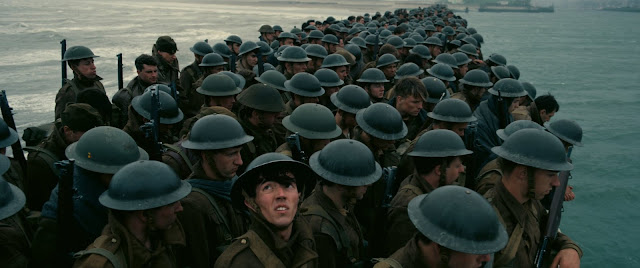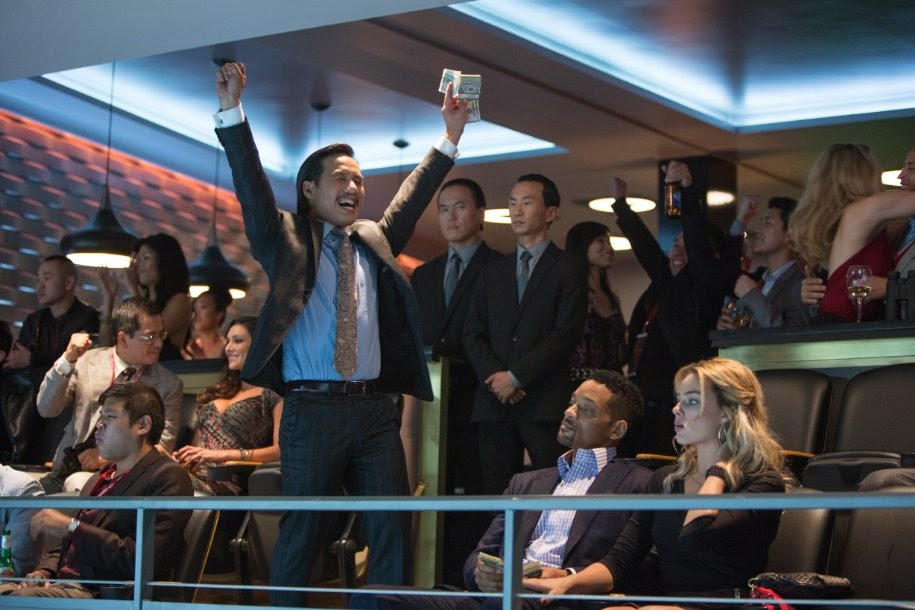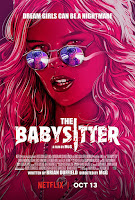Dunkirk
Dunkirk
(2017)
Directed by: Christopher NolanWritten by: Christopher Nolan
Starring: Kenneth Branagh, Tom Glynn Carney,
Tom Hardy, Cillian Murphy, Mark Rylance,
Harry Styles, Fionn Whitehead
Rating: PG*
Release Date: July 21, 2017
 |
| A soldier watches the sky from within a sea of soldiers. Image Source |
Within cinema, especially the English speaking world, the war genre has always been popular, and has always been a sure-fire way to make a few bucks at the box office. That's not to say war films don't have their merit - both World Wars were definitive moments in the history of man. The first world war was an exercise in sadism and misery, and the second pushed the limits of human indecency to the breaking point. Like one of the characters in David Ayer's underrated Fury says: "it's a hell of a thing, [...], seeing what a man can do to another man." From a philosophical standpoint too - war and war films allow directors and writers to showcase deeply unsettling philosophical quandaries in real time - Sophie's Choice is one of the defining examples of this. Yes, there are the quasi-satirical The Great Escape, The Dirty Dozen, or Where Eagles Dare, that, while great examples of 1960's action cinema, sanitize war and make it look like more of an adventure than what it really is - harrowing. There's a saying, I'm not sure by whom, that went "the best war films are anti-war." And from the few veterans I've either talked to, heard about or read about, they all say the same thing: "war is hell." The Deer Hunter, Platoon, Full Metal Jacket, and a select few others are examples of war films that give the audience a glimpse of the experience of war, the tribulations of it's warriors and the throes of violence, without demeaning or insulting veterans. It's this tradition that helps round out Dunkirk, which is truly one of the best war films ever made.
I've always held two films in extremely high regard: Saving Private Ryan was a war film that expertly showed the graphic brutality, human sacrifice, and importance of fighting for good when faced with seemingly insurmountable evil, without falling into the trap of being pro-violence. It was a magnificent and heartbreaking juggling act, by one of the worlds greatest living directors. On the other side of that coin was Schindler's List, an artistic, soul-crushing, yet life affirming look at the holocaust through the eyes of it's victims, perpetrators and saviours. It's still arguably the best film ever made, outside of genre, and because of it's subject matter, importance and cinematic excellence almost transcends the medium. Within the war genre, however, Christopher Nolan's Dunkirk is on the level of Spielberg's two definitive films, and is an absolute masterpiece.
Dunkirk tells the story of the evacuation of British, (and later French), troops from the film's eponymous shore in France. The German troops had begun to push back the French and English troops in the spring of 1940, effectively cornering them in Dunkirk where they faced the German war machine on one side, and the cold, rough, 20 mile wide English Channel on the other. There were over 400,000 English soldiers, waiting with little food and water, on the wet, cold, salty shores of France. As we hear from the hushed conversation of Commander Bolton, (Kenneth Branagh), and Colonel Winnant, (James D'Arcy), nearly the entire british Army is trapped on the beach, and of the near 400,000 men trapped there, only around 25 percent might make it home. The rescue ships were in short supply, and the larger military vessels had to be kept away in case the Brits needed to protect the homefront. The thinking behind such a dire situation was that they'd rather lose a majority of their army than the entire thing - yet, the Brits never give up - so they put out a call for civilian vessels to help evacuate troops. The smaller vessels could get to the men far easier, without as much danger from torpedoes and fighter planes, and hell, it would be a lot easier to get a ride on a small fishing boat than to try swim the channel, (just a quick digression here - calling it the "English Channel" is kind of a misnomer - it's wide open sea, that can be extremely rough, and very cold, and the distance between England and France is about the rough equivalent of a full marathon. Such a distance is hard on foot, let alone exhausted, war torn and submerged. When I took a ferry across it, it took well over an hour). Sadly, there were a few who tried this method, and, as a scene in the film accurately portrayed, resigned themselves to their fate and walked into oblivion. All in all, the situation was grim, nearly hopeless, and cruel. However, Brits have been known to never give up hope, and to keep pushing like an optimistic Sisyphus when everyone else has given up. Dunkirk truly shows the meaning behind the popularized British slogan; "keep calm and carry on."
Telling the story in three parts of the battle; from the French beach of Dunkerque, in the cockpit of british pilots over the English channel, and the hull of a British sailor on his way to pick up evacuees, Nolan's script is brilliant. Instead of identifying with archetypes the audience is thrown directly into battle - it's as if we've been placed beside Tommy, (Fionn Whitehead), who doesn't have time to think about his chances - he's just trying to survive moment to moment. We follow three different plot lines, as a silent observer, experiencing the events as they happened. The odd timeline of the three stories is tough to understand at first, but it soon becomes clear that they're taking place in the same timeline, albeit at different paces. Like Nolan's Interstellar, time plays an interesting role; we experience the same amount of story on the beach, the water and the air, but each take place, (respectively), within a week, a day, and an hour. This time altered plotline serves to both allow for a long story to be told in a short time, as well as amp up the stakes for the audience. One might think they know what's going on and who will survive once one scene is over, only to realize their perception was altered by their perspective in the next. Aside from Nolan, I haven't really seen anything quite like it, (Tarantino is known for playing with his timelines, but his whiplash style is something completely different), and it works brilliantly here. However, a good script is nothing without a talented cast to execute it. Dunkirk is arguably the best ensemble I've ever witnessed in a war film.
Nolan is an auteur who has worked with the best in the business, (Caine**, Freeman, Bale, Jackman, DiCaprio, Hardy, McConaughey, etc), and has explored almost every genre. From mystery and magic in The Prestige, to cold-blooded crime in Insomnia, psychology in Memento, memory and fantasy in Inception, as well as science fiction in Interstellar, he continues to challenge himself, (and his audience), with every new project. He virtually reinvented the comic book genre with his Dark Knight trilogy, and no comic book adaptation has lived up to that trilogy before or since, (seriously Zack Snyder, give it a rest). With Dunkirk, his first foray into historical cinema, it's no surprise that he assembles another exceptional cast. As Commander Bolton, Kenneth Branagh, (a brilliant director in his own right), is called upon to deliver key scenes, often simply employing his subtle expressions or idiosyncrasies to showcase devastating emotions. Mark Rylance, too, does some of his best work to date. As the cunning Rudolf Abel in Bridge of Spies he showcased a quiet intensity, (although I'm still a little sore he stole an Oscar from either Tom Hardy or Sylvester Stallone at the 2015 Academy Awards), but here, his quiet determinism is an emotional grounding in a harrowing cinematic experience. When Cillian Murphy, playing a shellshocked soldier says he'll never go back to Dunkirk, that if they do they'll all die, and that they need to turn the ship around, Rylance's Mr. Dawson replies, "There's no hiding from this son. We have a job to do." Not only do we see the pain, compassion and heroics in his voice, but we believe him. In that moment, Rylance, (and Nolan by proxy), pulls the viewer in, who has already seen the devastation and destruction, and asks them to continue into the abyss. It's a risky move, cinematically, and a testament to Rylance and Nolan that it works. This scene alone warrants another Oscar for Rylance. Tom Hardy, too, rounds out the big names in the cast, conveying fear overwhelmed by courage as a pilot who knows he might not make it home, but might as well save as many as he can while he has the chance. Aside from the A-List cast, Nolan takes a huge risk by placing a lot of the heft of Dunkirk on newcomer Fionn Whitehead's shoulders. He's the centerpiece of the film, and someone whom the audience can identify with. He could be me, you, a brother, son, or friend, and reinforces the fact that a lot of the soldiers who lived and died in the second world war were barely old enough to order a beer. Harry Styles, too, noted for his work in the popular group One Direction was a huge risk. As a distinct non-fan of boy-band pop music, I rolled my eyes when I heard of his casting, and figured it was just Nolan trying to entice young boys and girls to see a historical war movie. I could not have been more wrong. Not since Eminem in 8 Mile, Cher in Moonstruck, or Will Smith in 6 Degrees of Separation, has a singer had a better breakout performance. Not only does Styles do well in his role, he completely disappears into it. His work features the best natural skills I've ever seen in a young actor, and completely blew me away. Here's hoping he sticks in the acting business. The performances are one of the biggest foundations in the film and hold the burden of Dunkirk's history effortlessly.
Lastly, the cinematography of Dunkirk, is typically exquisite. In Inception Interstellar, Insomnia and the last two Dark Knight films, Nolan's cinematography has always been breathtaking. With Dunkirk he's outdone himself. A cross between the work of the natural light in Stanley Kubrick's Barry Lyndon, the majesty of nature in Terrence Malick's Days of Heaven and the stark reality of Spielberg's Schindler's List, Nolan, and his cinematographer, Hoyte Van Hoytema, create a verisimilitude that's increasingly rare these days. Seeing it on 70mm film at an IMAX theatre was an absolute privilege, and speaks to Nolan's credit as a true artist that he continues to stand by the merits of using film over digital, (if you're interested in the subject, Side by Side is a fantastic documentary on the merits of both film and digital filmmaking). As someone who has experienced trauma and suffered PTSD, Dunkirk is one of the first films I've seen that accurately portrays the intensity and confusion of trauma on screen, like a cinematic equivalent of artist Tom Lea's 2000 Yard Stare. In comparison to other WWII films like Saving Private Ryan, Nolan doesn't need to show graphic violence or multiple locations. By simply plopping his audience on the beach, and letting them fight to survive, he creates a far more frightening and memorable experience.
Overall, Nolan's Dunkirk uses a whip-smart, taut script that is perfectly calculated in terms of story, plotting and historical significance. Buoyed by Academy Award worthy performances by Rylance, Branagh and, (I can't believe I'm saying this), Styles, as well as beautiful cinematography, Dunkirk is one of the best war films ever made, likely the best film of 2017, and Nolan's masterpiece. It's not a happy film, and for some, (especially veterans), it might be a tough watch. But it's a necessary one.
GRANT'S RATING: 5/5 STARS
Dunkirk Teaser: "Never Surrender"
*Although I think everyone should see Dunkirk, it's brutal, hectic and traumatic images probably should warrant a higher rating - this isn't one to take the kids to. Go see the Emoji Movie instead! Just kidding. That would be much worse. Dunkirk might freak them out, but the Emoji Movie will scar them for life.
**It was reported that this was Nolan's first film since 2002's Insomnia not to feature Michael Caine. This is not true, Caine has a small voice cameo as a commander giving orders over the radio early on in Dunkirk.



Comments